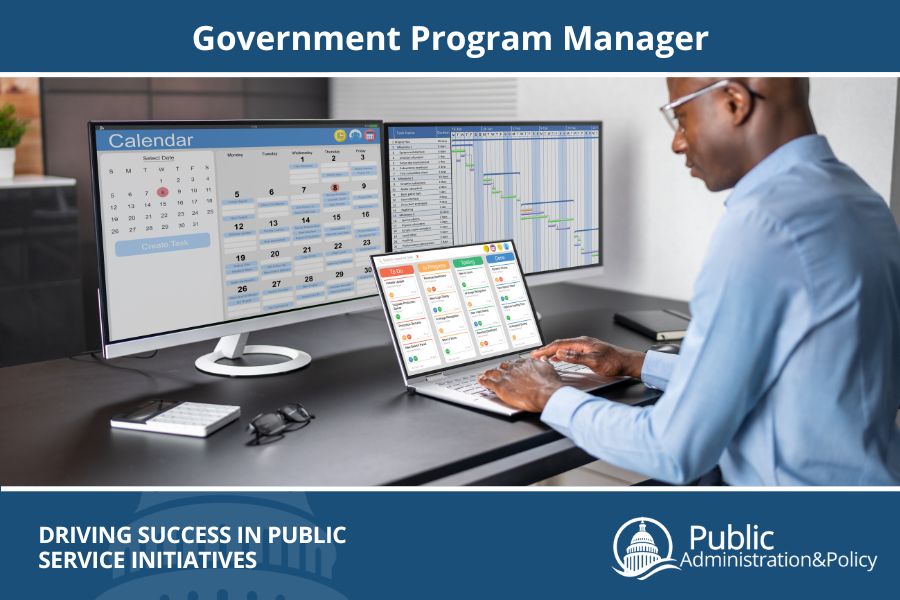How to Become a Government Program Manager
Drive the Success of Public Initiatives with Strategic Oversight and Leadership
Government Program Managers are the backbone of effective public service delivery, ensuring that programs addressing vital community needs are planned, implemented, and evaluated precisely. These professionals oversee all aspects of program management, from developing budgets and setting goals to ensuring compliance with regulations and measuring outcomes. Their work is essential to translating policy into action and creating a tangible impact on the lives of individuals and communities.
In this role, Government Program Managers often act as a bridge between various stakeholders, including government agencies, nonprofit organizations, and private sector partners. They must balance strategic oversight with operational management, navigating complex challenges such as resource allocation, risk assessment, and stakeholder engagement. This career demands a deep understanding of public affairs, a talent for leadership, and a commitment to upholding transparency and accountability in service delivery.

Table of Contents
What Is a Government Program Manager?
A Government Program Manager oversees the planning, execution, and evaluation of programs that serve public interests. They work in the healthcare, infrastructure, and education sectors, ensuring that resources are used efficiently and outcomes align with organizational goals.
Key Responsibilities
- Program Development: Designing initiatives to address public health, transportation, and education needs.
- Budget Management: Allocating financial resources effectively and ensuring compliance with federal government regulations.
- Team Leadership: Managing diverse teams and collaborating with stakeholders, including elected officials and community leaders.
- Performance Evaluation: Using data analysis to assess program outcomes and improve efficiency.
- Stakeholder Communication: Liaising with public sector agencies, private sector partners, and community members.
Government Program Managers are critical in ensuring public services run smoothly, directly impacting local, state, and national communities.
“Project management is like juggling three balls: time, cost, and quality. Program management is like a troupe of circus performers standing in a circle, each juggling three balls and swapping balls from time to time.”
— G. Reiss
Step 1: Complete Your Degree
A strong educational foundation in Public Administration, Public Policy, or related fields is essential to becoming a Government Program Manager. These degrees equip students with the necessary management experience and analytical skills.
Recommended Degrees for Government Program Managers
- Bachelor of Public Administration: Introduces students to public management principles, policy analysis, and budgeting.
- Master of Public Administration (MPA): Focuses on advanced topics like program evaluation, leadership, and financial management.
- Master of Public Policy (MPP): Offers in-depth training in policy design and implementation.
- Ph.D. in Public Administration: Prepares professionals for top-level executive roles or academic careers.
Why Choose Online Programs?
Online degree programs offer flexibility, enabling working professionals to earn a master’s degree while maintaining their current responsibilities. Many universities across the United States offer online MPA and MPP programs for busy students.
Explore programs like the Master of Public Administration to learn more.
Step 2: Learn About Government Program Manager Salaries
Government Program Managers are well-compensated for their expertise, with salaries reflecting the scope and complexity of their responsibilities.
Average Salary Ranges
- Entry-Level Roles: $60,000–$80,000 annually.
- Mid-Career Roles: $80,000–$110,000 annually.
- Senior Roles: $110,000–$150,000+ annually.
Factors Influencing Salary
- Education Level: A master’s degree in public administration or related fields significantly boosts earning potential.
- Experience: Managers with years of program and project management experience earn higher salaries.
- Program Scope: Salaries often increase with the size and complexity of the programs managed.
For detailed salary information, visit the Bureau of Labor Statistics (BLS).
Step 3: Build Leadership and Analytical Skills
Government Program Managers must excel in leadership and analytical skills to manage programs effectively and navigate complex challenges.
Key Skills for Government Program Managers
- Strategic Planning: Developing long-term strategies to meet program objectives.
- Budgeting Expertise: Managing program budgets and ensuring financial sustainability.
- Data Analysis: Using metrics and research methods to evaluate program success.
- Communication Skills: Engaging with stakeholders, including elected officials, civil servants, and community leaders.
- Project Management: Leading teams and ensuring that all project goals are met.
Consider earning a Project Management Professional (PMP) certification to enhance your qualifications.
Step 4: Find a Government Program Manager Job
Government Program Managers are employed by various organizations, from federal government agencies to local governments and private consulting firms. Networking and staying informed about job postings are key to finding the right role.
Industries Employing Government Program Managers
- Federal Government: Overseeing large-scale programs in national defense and public safety.
- State and Local Governments: Managing public works, education, and healthcare programs.
- Nonprofit Organizations: Leading initiatives that address community needs, such as affordable housing and economic development.
- Private Sector: Advising public sector clients on program and project management strategies.
Notable Employers
- U.S. Department of Health and Human Services (HHS)
- Federal Emergency Management Agency (FEMA)
- National Association of Counties (NACo)
Job boards like USAJobs.gov and Idealist are excellent resources for job postings.
Career Opportunities in Government Program Management
A career in Government Program Management offers many opportunities in the public and private sectors. Some popular roles include:
- Program Manager: Leading government programs in public health or emergency management.
- Budget Analyst: Evaluating and monitoring government spending.
- Policy Advisor: Guiding the development and implementation of public policies.
- Public Affairs Specialist: Managing communication between government agencies and the public.
Prominent organizations offering these roles include:
Sources
- Bureau of Labor Statistics (BLS). “Occupational Outlook Handbook: Management Analysts.” https://www.bls.gov
- Project Management Institute (PMI). “Project Management Professional (PMP) Certification.” https://www.pmi.org
- Federal Emergency Management Agency (FEMA). “Careers in Emergency Management.” https://www.fema.gov
Acknowledgments
Content inspired by insights from government agencies, nonprofit organizations, and educational institutions, guiding aspiring Government Program Managers.
